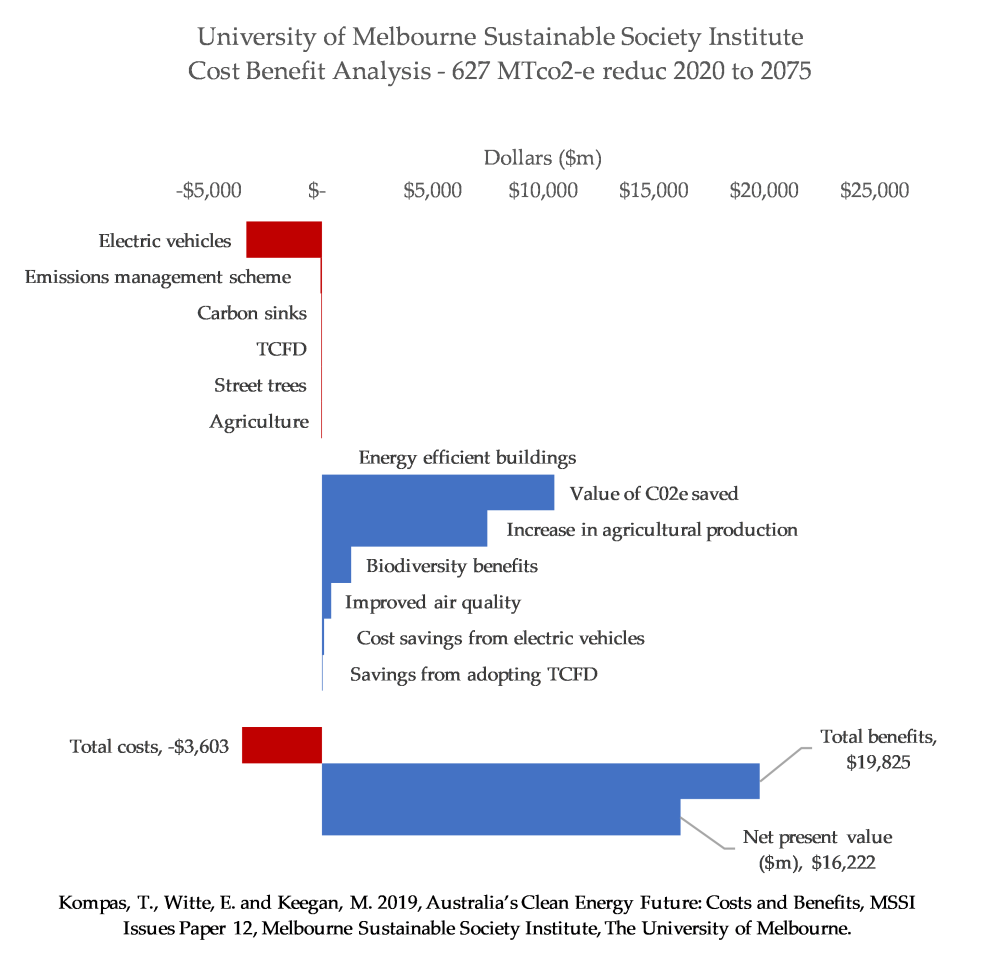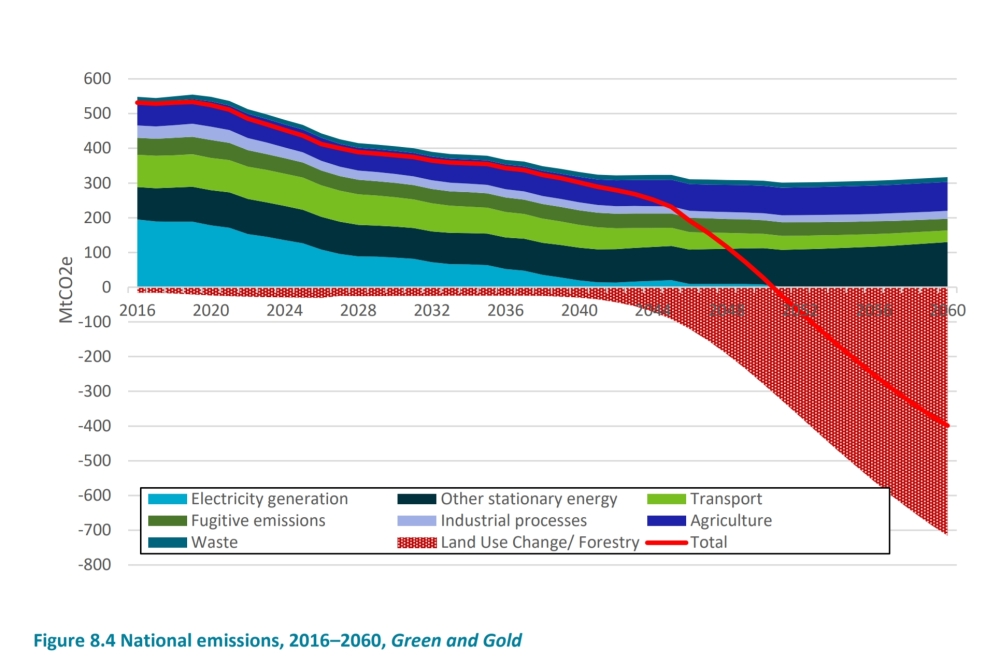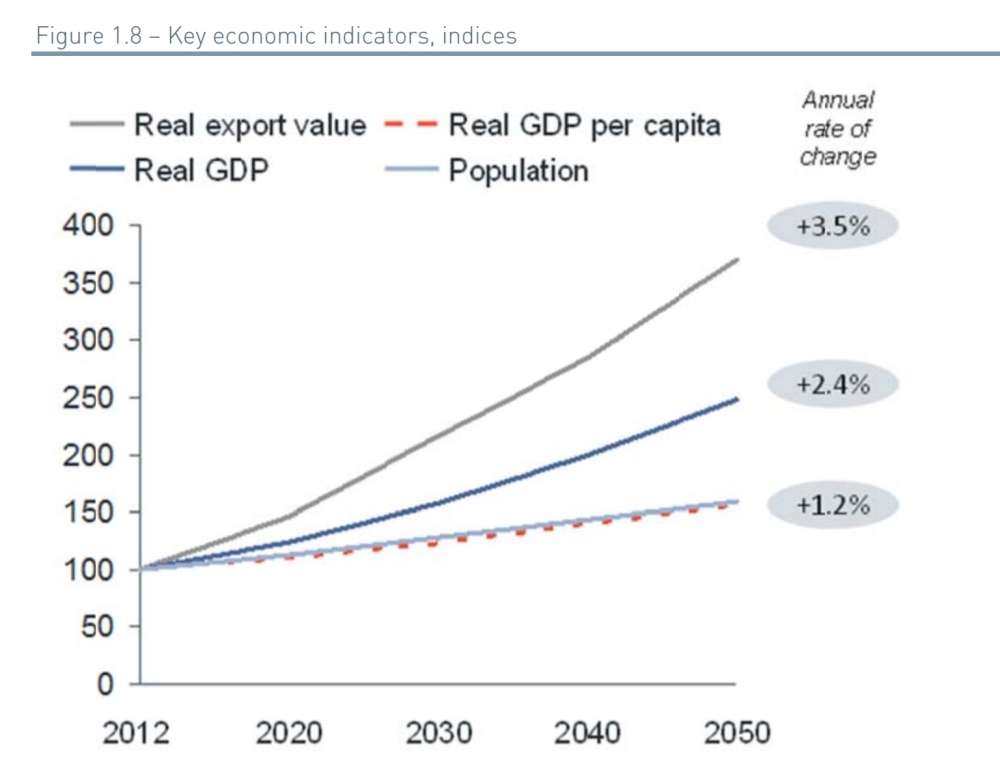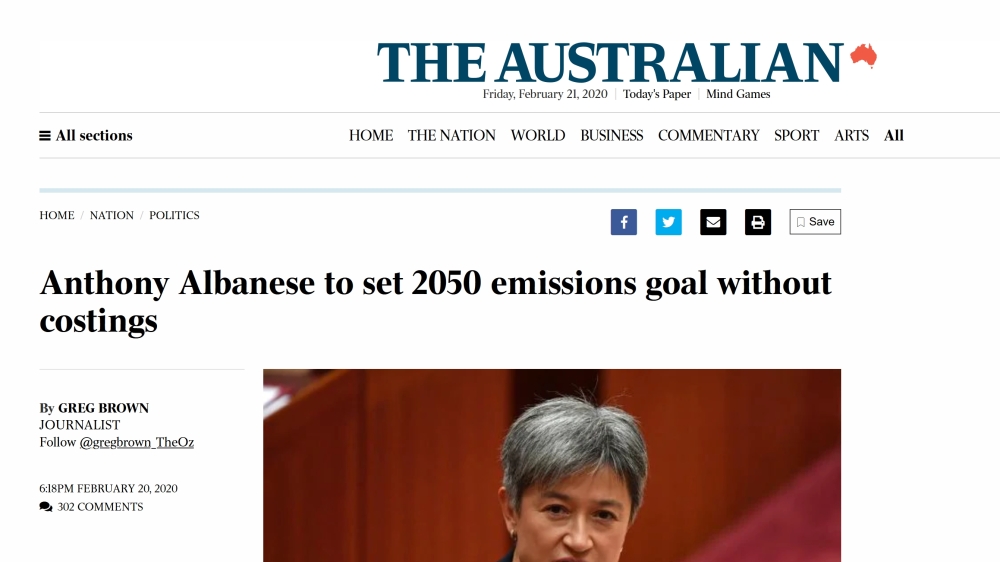I hope you’re prepared to hear the word ‘COSTINGS’ shouted repeatedly for an entire year
Climate change is a threat to life on this planet, and its cause, human-released greenhouse gas emissions, needs to be reduced. Transforming the way our species utilises energy is…..hard. But when it’s done right, the immediate benefits of technological and social upgrade, alongside the long-term benefits of not-boiling-our-only-home ,vastly outweigh the the costs of change. We know this because clever people have checked.
A pathway to emissions reductions was modelling by the University of Melbourne’s Sustainable Society Institute, here. It stretches the time-span out to 2075, and it uses Victoria and Queensland as their baselines, but the results are clear – the benefits of action far outweigh the costs:

Here’s where things get a little wild. If you completely ignore the benefits from reducing emissions, and only consider the immediate benefits of reducing emissions, it’s still a net benefit:

Professor Tom Kompas, one of the authors of that study, published an update recently that looks purely at reaching ‘net zero’ (where any remaining emissions are sucked out of the atmosphere using trees and machines) by 2050. His findings show that there is “more than a 20 to 1 ratio of the damages from climate change to the costs of emissions reduction….The low cost and the big return stems largely from the rapidly falling prices of renewables. The switch to renewables lowers electricity prices and labour and capital in fossil fuel industries is largely absorbed into other sectors”.
Renewable energy going from fairly expensive to dirt cheap has caused a ludicrous shift in these modelling exercises. It is now extremely hard to tune settings to get an outcome that shows climate action is bad (without dipping your toes in actual fraud).
Guess what, other people have checked too! The CSIRO – Australia’s National Science Agency – found in their Australian National Outlook report released in 2019 that net zero emissions would have virtually no impact on the nation’s GDP:


“This decoupling of emissions from GDP demonstrates that stronger action on environmental measures need not come at the expense of economic outcomes”, the CSIRO scandalously declares.
An older study– from 2014 – published by ClimateWorks finds something pretty similar. Wind and solar have dropped significantly in cost since their report was published, but they still find that “Australia can decarbonise whilst maintaining economic prosperity. This study shows that real GDP grows at 2.4% per annum, a similar rate to the past 5 years”


Are you still not convinced? Do you feel slightly helpless, at this cruel barrage of checking? Well, if you really want to take the reins, you can go and visit the Climateworks / Australian National University 2050 scenario calculator here. Please do, play around with the nice buttons, and come back. You will get a good idea of the kind of changes that need to happen to get to this target, or at the very least, the smooth animations will make you feel good. You can play with the UK’s one here. To summarise: lots of people have checked, and it turns out that strong emissions reductions have far greater immediate and long term benefits than the costs that go into enacting them.
Costings, costings, costings, just give me costings, why am I saying costings! Help
There’s no guarantee that net zero by 2050 would be either an immediate or long-term benefit, because the goal doesn’t set the cost, the pathway sets the cost. The modelling exercises above simply highlight that a pathway that is immediately beneficial and eventually even more beneficial was feasible back in 2015, and is now ridiculously feasible, because wind and solar power have become eye-wateringly cheap.
If your aim is to stop climate action – even if it is something that helps Australians live better, healthier and less expensive lives in the short term – it is in your best interest to put on your biggest, cruellest boots and stamp out any attempt to talk about the costs of continued rising emissions, or the immediate benefits of decarbonisation, and focus solely on the downside.
Roughly, that stamping action will look something like this clip, featuring Channel Ten reporter Jonathan Lea, and ex-opposition leader Bill Shorten, during the May 2019 federal election campaign:
In the clip, which gets real spicy towards the end, the journalist grows extremely impatient at not having received the tiny slice of the equation he was hoping to hear. The situation repeats four days later, on the 20th of April, 2019:
Towards the end of that clip, the following exchange occurs:
Lea: Can’t you see that that cost will be passed onto consumers?
Shorten: I think that the cost of climate change is now being passed onto consumers.
Lea: But it’s [the cost of Shorten’s climate policy] going to be much bigger, much more onerous, isn’t it?
Shorten: Well, that’s where we fundamentally disagree.
Labor’s climate policy was not easy to put a price on. It had a target, and a loose set of policy frameworks, but it was waiting to flesh out the details, and therefore it would’ve been pretty dishonest to slap a number on it. Regardless, the journalist makes the very clear and important assumption that the policy would cost far more than it would save.
This assumption amongst journalists – not just asking questions but declaring that the costs of action are greater than inaction – was not uncommon. Shorten’s climate change policy was presented as a painful economic hit – all pain, no gain – in News Corp’s media outlets. It was a wild campaign. When The Australian – the national outlet – smells the blood of a wounded climate policy, their appetite can never be satisfied.
This was a widespread phenomenon. Here’s a range of non News Corp media outlets joining the stampede, including the ABC:
Australia’s 2019 federal election campaign focusing solely on the costs of climate action – originating from the Liberal party but spreading through media outlets. The double-standard was significant too, with the Liberal Party’s ‘Climate solutions package’ and 26-28% emissions reductions target spared the same treatment. Launch-day interviews on 7, ABC, and Sky News don’t mention “costings”, or an impact on GDP, and only Sky News mentions the budgetary impact of the scheme.
It sounds reasonable. Surely, people have a right to know the costs of a policy? By appealing to this plea, the responsibility of accurately and honestly presenting both the costs and benefits, alongside the difficulty of ‘costing’ something uncostable, is ditched.
Framing climate action as too costly has always been standard for conservative politicians and media outlets. The 2019 election saw that approach spread far and wide across most of Australia’s media landscape.
We still want to see the costings, sir, SIR, where are your COSTINGS
After Labor’s election loss, the party tread water for months. Now, they’re getting their courage back. Sort of. The net zero by 2050 target that Bill Shorten agreed to in the year 2015 has been re-announced as a new target by the new leader, Anthony Albanese, and that re-announcement of that old ambition has seen the re-establishment of the same meme.
“Albo will today say that Labor will deliver net zero by 2050. But he doesn’t put a cost on it. He will have to soon, otherwise Scott Morrison will destroy him”
– John Rolfe, Daily Telegraph

And, like last time, it has spread to all media outlets, like this interview on the ABC (in the ABC’s defence, Wong brings up the cost / benefit question, but the follow ups are entirely focused on the ‘costings’):
It is immediately followed by this exchange, focused – again – entirely on the “costings” of Labor’s net zero ambition:
Today, when Albanese is set to deliver his announcement, the ABC has said in a radio piece that “Labor copped a heavy blow at the last election for not being able to explain how much its policies would cost”, and quoted Energy Minister Angus Taylor, who said “It’s crucial that any target that’s set has a clear plan to get there and is properly costed”.
Taylor is going to be in charge of “modelling” net zero to 2050. It’s going to be a difficult task to make it look expensive, but the government is up to the challenge. They will ignore the costs of climate inaction, ignore the co-benefits of action, assume the worst possible variables in modelling, and frame the final number as a big scary billion figure. That will be the headline, in the lead up to COP26 in Glasgow, at the end of the year. Net zero costs a billion megadollars.
The government’s framing will be helped along not just by the conservative arm of Australia’s media, but by most of it. Within hours of Labor’s announcement, we are already seeing the precise pattern playing out, despite this announcement being only part of Labor’s 2019 policy.
You’d think a summer of truly horrific bushfires would sharpen these lines of inquiry. “What about the benefits?” “What about the costs of inaction?” “Do Australia’s exports contribute to the increasing levels of danger for our people?”. No, nothing of the sort. Just ‘Sir, the COSTINGS’, up to and including the 2022 election. It’s so depressing.




















Yes, a repeat of the hammering of the uncertain costings of Labour’s climate plan at the last election is very likely. Surely they must be able to turn the tables and ask the LNP to show costings for their ‘business as usual’ approach. How could they possibly show this would produce a better outcome? With models like the one from the University of Melbourne’s cost benifit analysis available, it would now be easier to show the dire consequences of inaction and this would be difficult to counter. LNP won that debate last election with an effective scare campaign but any party advocating for climate action now has an equally scary picture to paint in the minds of voters who have now lived through the worst fire season ever.
I also feel that it’s important to point out the bigger picture of just how seriously other countries are taking the issue. The Australian media could play an important role in this awareness.
LikeLiked by 1 person